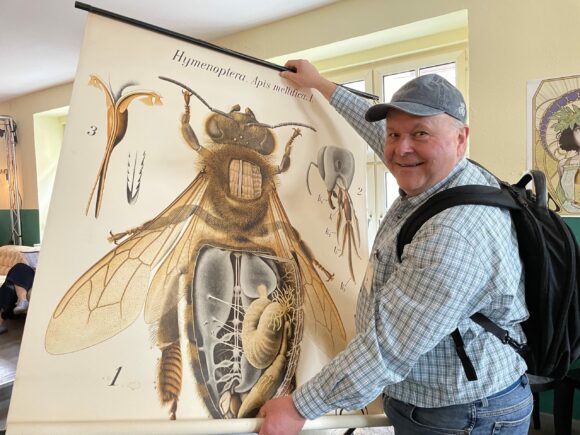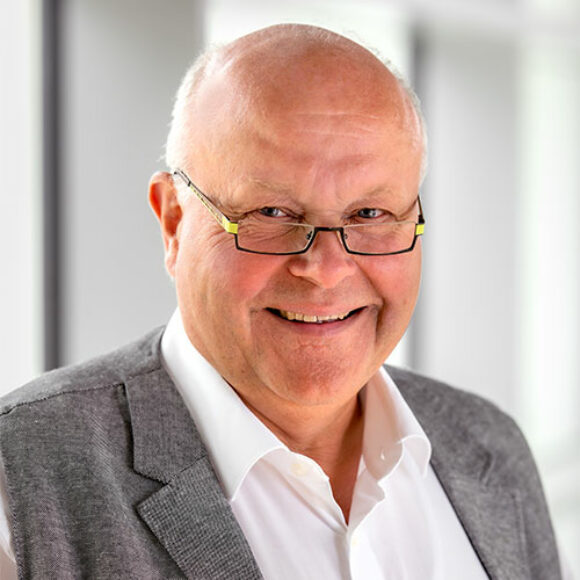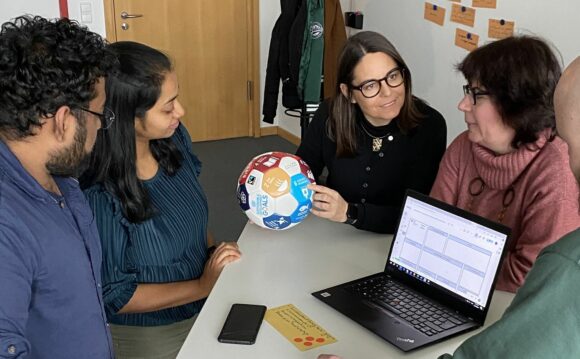Hof University of Applied Sciences currently has not only a record number of students, but also the highest number of research projects in its history. Quite a few of the current projects and developments are directly or indirectly interwoven with the Hof region and the neighboring regions: Many research results from the Hof campus are already being implemented in local companies or are foreseeably about to be applied in practice. A good quarter of a century after its foundation, Hof University of Applied Sciences is thus one of the region’s major drivers of innovation – especially in the field of ecologically sustainable developments.
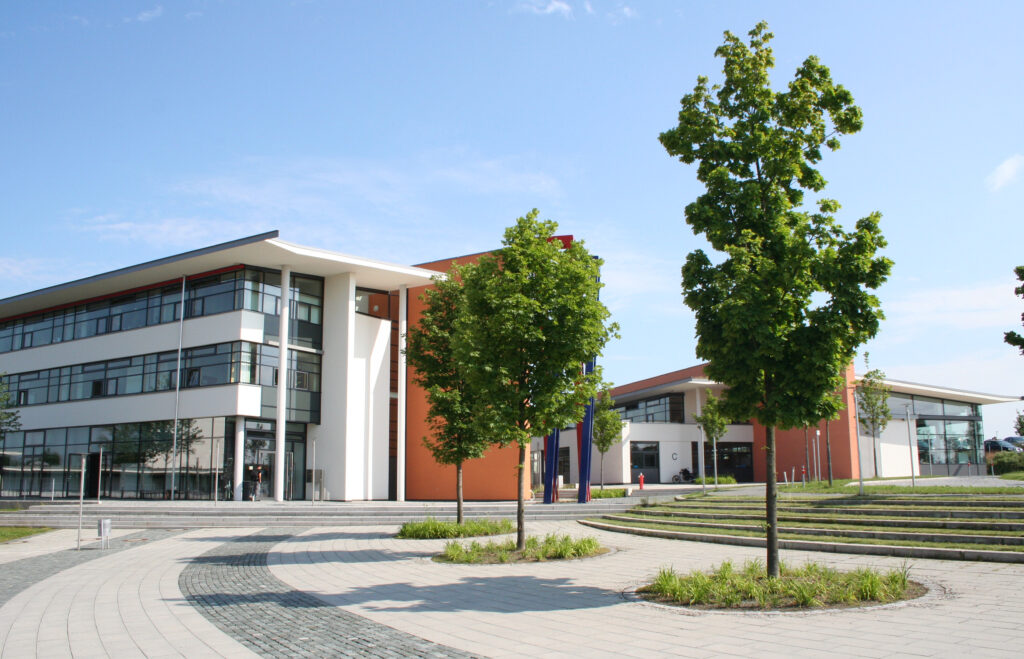
The regions’ expectations of “their” universities as drivers of innovation are high. How Hof University of Applied Sciences lives up to these expectations is often demonstrated by the interaction of local networks and, above all, by the quality of its research. Does it cover the topics of the local companies? And is the university able to train its students accordingly?
In the Hof region, this seems to be coherent. “Our career-oriented teaching happens with high quality. In addition, our university has recently also recorded a remarkable increase in its own research topics and innovations. These not only strengthen the attractiveness of the university itself, but often benefit our region first and foremost. Much of this relates to growth industries that take an ecological approach,” says university president Prof. Dr. Dr. h.c. Jürgen Lehmann.
Modern mobility
A good example, some of which is already visible, is the issue of future mobility. Hof University of Applied Sciences coordinated the “MobiDig” research project funded by the German Federal Ministry of Transport. There, researchers analyzed the mobility needs of the Hochfranken model region from 2017 to 2020 together with partners from science and administration. The results are reliable forecasts of future traffic flows and proposals for the best possible linking of different transport options – from buses to car sharing. Based on these results, the population is to become more independent in the medium term and also gain more freedom of movement beyond individual transportation.
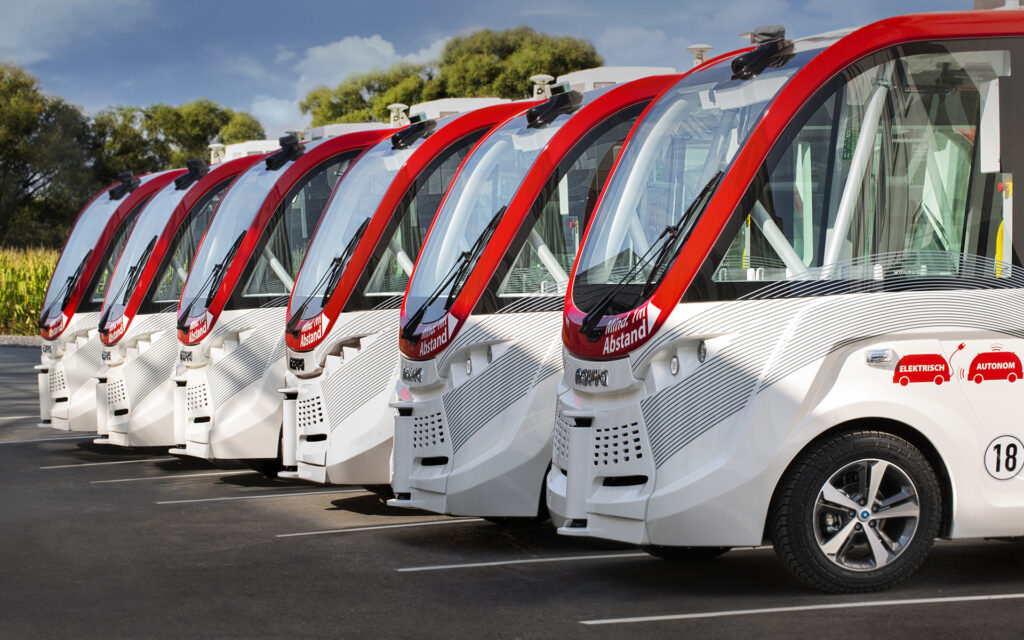
Hof rural bus and autonomously driving buses
One measure is the expansion of demand-driven mobility, for example in the form of the Hof rural bus already in operation. Hof University of Applied Sciences is also a research partner of the “Shuttle Model Region Upper Franconia SMO,” which is further developing autonomous buses as part of projects in Kronach, Rehau and Hof. The futuristic-looking minibuses without drivers, which travel at low speeds, always generate a lot of interest among passers-by. With their self-learning system, the buses are getting better with each day they operate in city centers and are expected to contribute to an efficient transportation system in the future.
Another research group of the Institute for Information Systems (iisys) is taking a close look at the user behavior of car drivers. Partly for regional economic partners, driving tests with autonomous parking assistants in modern motor vehicles were carried out. Extensive data was collected and analyzed using video recordings and quantitative and qualitative surveys. This research is intended to help improve driving safety and the user-friendliness of future control systems.
Regional hydrogen from biomass
Innovations for the energy turnaround are being developed at the Institute for Water and Energy Management at Hof University of Applied Sciences (iwe): Together with research partners, a novel process was developed to produce high-quality hydrogen from biomass. As a result of the development, a company has already been founded, which, according to managing director Dr. Andy Gradel, has met with lively interest on the part of industry. In addition to selling turnkey plants for steam reforming of biogas, the young company BtX energy GmbH wants to create an overall concept for the regional production and use of green hydrogen for the Hof region – a pioneering undertaking.
Environmentally friendly plastic products with biowaste
Will there soon be packaging in the supermarket made with bio-waste from local sources or agricultural film made with old coffee grounds? Quite possible! At the Institute for Applied Biopolymer Research at Hof University of Applied Sciences (ibp), a junior research group is investigating the influence of natural radiation and the use of biogenic residues on the properties and structure of bioplastics. This could make these bioplastics interesting for a sustainable product economy in the sense of the bioeconomy in the future. Among other things, biowaste from the food industry and forestry is to be used in the bioplastic mixtures and thus fed into a natural reuse.
Degradable films for agriculture
Meanwhile, a feasibility study by the same university institute will lay the groundwork for biodegradable films in agriculture. The so-called silage films that are being used increasingly have so far been produced conventionally and are generally based on petroleum. They leave behind detectable microplastics in the soil, and the common films are also purely disposable. The researchers’ goal is for the films to consist of 100 percent renewable raw materials in the future. This should result in a product that is compostable or recyclable and can thus be perfectly integrated into the agricultural production cycle.
Innovative textile production
But the region’s traditional industry also benefits from Hof University of Applied Sciences. The EFRE project (European Regional Development Fund) “Textile Industry 4.0” is running at the Institute for Material Sciences (ifm) at the Münchberg campus. It deals with technology transfer, especially to small and medium-sized enterprises in the region. The most modern and sustainable processes for textile production are conveyed. All companies in the regional textile industry that have no more than 250 employees and whose sales do not exceed EUR 50 million can participate.
Exchange between European regions
The Interreg project “Digital Regions”, which is being implemented at the Institute for Information Systems (iisys), is also about know-how transfer. It aims to contribute to a better Europe-wide exchange of experience and information on strategies and methods in the field of digitization and Industry 4.0 by making better use of existing European, national and regional funding opportunities. The eight partner regions are looking over each other’s shoulders and learning from each other on the basis of best practices. Local companies do not always have to reinvent the wheel, but benefit from existing knowledge on which they can build.
Recognition from politics
The contribution of Hof University of Applied Sciences to the development of the region is also appreciated by politicians
Hof University’s orientation as a Green Tech University is repeatedly brought to life. Sustainability and ecological future viability are the focus of a large number of research projects. The fact that this knowledge is also being applied locally is a great benefit for the Hof region.”
District Administrator Dr. Oliver Bär
Hof’s Lord Mayor Eva Döhla also agrees
Hof University of Applied Sciences is one of the great location factors for our city. It does far more than impart knowledge – it creates new knowledge, usable findings and promotes innovation. For example, I am pleased with its participation in the Shuttle Model Project Upper Franconia. Here, research and progress can be experienced directly in the city of Hof.”
Mayor Eva Döhla




